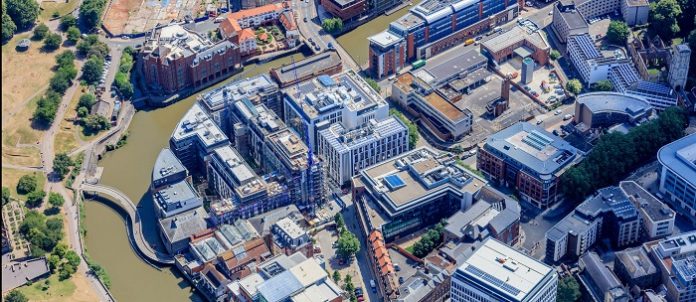City centres across the South West and beyond are set for transformation as housing, offices and leisure facilities replace empty retail space, but this wave of change should be seen as an opportunity, not a threat, says JLL.
City and town centres need to be refashioned into ‘city neighbourhoods’ and community hubs offering a mix of housing, workspace, leisure activities and shopping to ensure they meet the needs of their populations, according to property consultancy JLL.
JLL will reflect on the latest trends and share its predictions for the future when it hosts its annual South West Property Market Review in Bristol this evening (Thursday 31 January). For the first time, the audience of leading business and property leaders will take part in a live poll to gauge their views on the big topics of today.
JLL echoes the words of retail expert Bill Grimsey, who said ‘there’s simply too much retail space in the UK’, adding that whilst 2018 was a bad year for big retailers such as House of Fraser, HMV, Toys R Us and Maplin in the face of changing consumer habits, it’s not all doom and gloom.
“The location of old department stores and large shops are often ideal for other uses such as much-need homes, offices, hotels, restaurants, cafes or bars”, said Simon Peacock, lead director at JLL in the South West. “Our city and town centres need to become places for people to live, work, shop, eat and relax, adding diversity and bringing people in. A mixed-use approach is the direction of travel, signifying the end of an era where urban areas were zoned according to use, and we’re already seeing this with the success of Finzels Reach and Wapping Wharf in Bristol.”
In Bristol, the Temple Quarter area is set to be transformed, with housing and workspace to sit alongside the University of Bristol’s new Temple Quarter Enterprise Campus, whilst the future Temple Meads train station redevelopment and launch of the MetroBus represent much-needed transport investment. This investment in transport hubs is critical to meet the needs of a growing population, says JLL, to bring ‘city neighbourhoods’ closer together and draw people into the city centres.
JLL says that there has been a shift of focus in the planning system with schemes such as the development of the Callowhill Court area, encompassing the area of Broadmead including The Horsefair through to Quakers Friar in Bristol city centre, favoured over Cribbs Causeway’s extension of the Mall on the outskirts of the city, which was rejected.
The National Planning Policy Framework, which sets out the government’s planning policies, has responded by categorising the use of buildings according to whether they align with the terms ‘destination’, ‘lifestyle’ or ‘community’, rather than ‘primary or secondary retail’. And, over the last five years, 40 per cent of the money invested by councils has been in the retail and leisure sector, allowing them to take control of these areas and drive much-needed change.
Other trends expected to shape the future of Bristol city centre include the drive towards densification including taller buildings and the growth of the build-to-rent sector, a new model where homes are designed specifically with renters in mind and with an emphasis on communal spaces.
Meanwhile, a fourth industrial revolution driven by the tech sector will see the next few years define which cities will become the destination for choice for tech businesses. With Centre for Cities predicting that in 11 years 21% of all current jobs won’t exist, cities across the West of England are in ‘an arms race with other city regions’ to attract these businesses in. As big companies, as well as niche firms, grow their tech jobs, they are being forced to rethink where they are located and seek out cities where they can access the skills base needed.
Simon Peacock added: “In Bristol, we do well in attracting and keeping the talent these tech firms so badly need, but we must have better transport links and convince our councils and communities of the need to grow and change if we want our cities to secure this prize and prosper.”
“There are two things that are essential for the future success of Bristol city centre, or indeed any town or city centre; they are strong civic leadership and a vision for the future”, he added. “The changes to our retail sector should be seen as an opportunity, not a threat. In Bristol, we need more housing, we need investment in infrastructure and more places for people to work. It’s a no brainer to capitalise on the opportunities changes to our retail landscape and transport hubs bring to ensure our city’s future prosperity.”
JLL’s South West Property Market Review takes place at 6pm at We The Curious in Bristol today (Thurs 31 January). The theme will be ‘Challenges or Opportunities’ with speakers providing updates on the key markets across the region. Jon Neale, head of research UK at JLL, will share JLL’s economic forecasts for 2019.





















